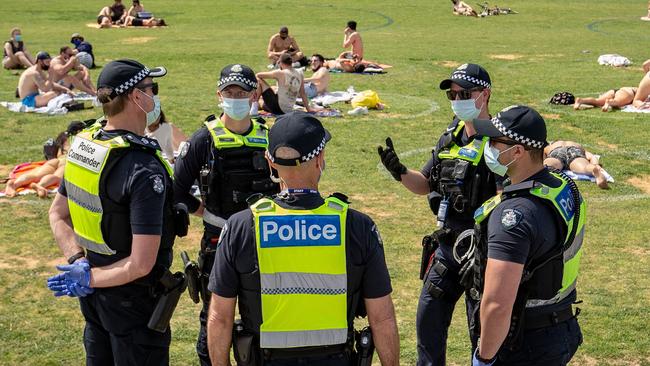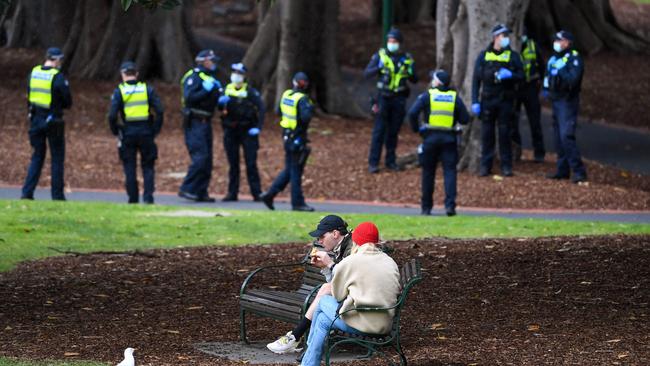Shannon Deery: DHHS can’t be trusted with omnibus bill’s proposed detention powers
Almost all the omnibus bill is completely uncontroversial. Much of it is incredibly important legislation, but the bill would place great powers of detention in delegates of the DHHS and that is a real concern, writes Shannon Deery.

Opinion
Don't miss out on the headlines from Opinion. Followed categories will be added to My News.
Victorians have reason to be wary of the state government’s controversial COVID-19 omnibus bill.
Indeed, the more we learn about the handling of the pandemic, the more we should worry.
Let’s be clear: almost all the omnibus bill is completely uncontroversial. Much of it is incredibly important legislation that if not passed could have really significant consequences — stuff like temporary measures that allow the ongoing operation of essential public services during the pandemic: courts, local governments, support payments people with long-term workplace injuries.
It also allows planning permits and panel hearings to be carried out electronically and for teacher and training organisation renewals to be done online.
This is all vital but due to expire about now, as the measures were only ever meant to be temporary.
But given the pandemic has lasted much longer than envisaged, the six-month limit is not enough and the omnibus bill seeks to extend provisions until April next year. That all makes sense.
However, what is controversial is that the bill also seeks to give authorised officers the power to detain people they deem to be a serious risk to public health.
How long could they be detained? As long as necessary.
Under the bill, authorised officers could be literally anyone the secretary of the Department of Health and Human Services deems appropriate.
Unsurprisingly, this has sparked widespread alarm among lawyers, judges and human rights activists.

The government, predictably, says trust us, the powers won’t be abused and there will be plenty of checks and balances to keep everything in order. But will it?
Twice last week serious questions were raised about the ability and willingness of the government and its authorised officers to respect our human rights while handling this pandemic.
The first came in the Supreme Court case challenging the validity of Melbourne’s now defunct curfew. Documents filed in the course of the trial revealed DHHS legal advice warned that there was the risk the curfew would breach human rights.
It went ahead anyway, according to Deputy Public Health Commander Michelle Giles, because of overwhelming scientific evidence that it was necessary.
Daniel Andrews says it was necessary from a law and order point of view, despite there being no health advice urging it.
The second cause for concern, again involving DHHS legal advice, was hidden in documents tendered to the hotel quarantine inquiry. The advice reinforced the need for the department to review every 24 hours the holding of a person in detention.
The inquiry has been told this did not happen, and the lawfulness of the DHHS’s actions has been raised. From this, legal action could follow.
But there seems to be a worrying pattern that legal advice is simply cast aside as necessary.
This cannot be the modus operandi of any government or government department.
The omnibus bill has already passed the lower house and will go to a vote in the upper house next week. The government is working with key crossbenchers to garner enough support for it to pass, and will almost certainly be forced to water aspects of it down.
As it is, the bill would again place great powers of detention in delegates of the DHHS.
The question is, can they really be trusted to act in accordance with the law, and our human rights?
AND ANOTHER THING
This week’s federal budget could further test increasingly strained relationships between the state and federal government.
In the weeks since the rest of Australia got on with their COVID normal, leaving Victoria languishing behind, the niceties of all being in this together seem a distant memory.
Scott Morrison and Daniel Andrews have been at loggerheads over various issues: ADF support on offer to help hotel quarantine and the speed at which Victoria is opening up to name just two.
But tensions have boiled over ahead of the budget with federal treasurer Josh Frydenberg demanding Victoria get on board a construction-led pandemic recovery. It sparked a war of words with the Premier, who said his government’s record of pouring concrete was testament to his construction commitment.
Indeed $1.3 billion from the federal government would see shovels in the ground for at least 10 significant projects that are ready to go.
The commonwealth has flagged Victoria will receive some special attention in Tuesday’s budget, with aid likely to be in the form of cash injections to support infrastructure.
Business groups want more significant help in the form of tax breaks and wage subsidy schemes.
The economic devastation sparked by Victoria’s second wave risks damaging not just the state for years to come. Given it accounts for more than one fifth of GDP, Victoria’s economy has a significant impact on the national economic outlook.
Now more than ever it seems it would serve us all well if we were truly all in this together.
SHANNON DEERY IS HERALD SUN STATE POLITICS EDITOR
